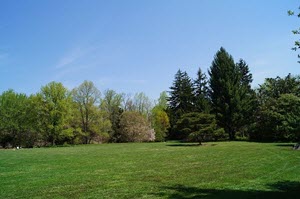Posted in Blog, Israel F. Piedra, News & Articles
Disputes with neighbors are, unfortunately, a not-uncommon occurrence. They can be unpleasant, stressful, and sometimes escalate into a lawsuit.

One category of neighbor dispute involves trees. Many folks take the trees on their property for granted — they exist and serve a purpose, but we don’t think too much about them. However, if a tree is suddenly destroyed, a property owner may quickly come to miss the tree’s benefits. Trees can provide shade, beauty, and privacy. They can also be used for other purposes such as lumber or firewood. Depending on the type of tree and its use, trees are often more valuable than one might expect. Additionally, there may be insurance coverage available from which to recover damages.
The cutting-down or destruction of trees on someone else’s property is termed “timber trespass.” Timber trespass can be either intentional or accidental.
- RSA 227-J:8 — The Timber Trespass Statute
New Hampshire has a long history of protecting and valuing trees. As such, it has enacted a statute providing for certain penalties for timber trespass. The statute, found at RSA 227-J:8, reads as follows:
No person shall negligently cut, fell, destroy, injure, or carry away any tree, timber, log, wood, pole, underwood, or bark which is on the land of another person, or aid in such actions without the permission of that person or the person’s agent.
In addition to any other civil or criminal penalty allowed by law, any person who violates the provisions in paragraph I shall forfeit to the person injured no less than 3 and not more than 10 times the market value of every such tree, timber, log, lumber, wood, pole, underwood, or bark cut, felled, destroyed, injured, or carried away.
The second paragraph of the statute provides significant monetary penalties for timber trespass – between 3 and 10 times the “market value” of the tree cut or destroyed. The amount of the statutory multiplier is determined by the factfinder. The statute, on its face, provides no guidance about how the jury is to select a suitable multiplier; generally speaking, however, the more egregious the wrongful conduct (i.e., willful as opposed to merely negligent), the higher the appropriate multiplier. See Hynes v. Whitehouse, 120 N.H. 417 (1980).
2. Compensatory damages for tree cutting
Stumpage value, however, does not always represent the full value of a tree. In a residential setting, a tree’s value more likely derives from providing shade, privacy, or beauty. In those situations, the tree owner may recover compensatory damages in addition to the statutory stumpage value. Woodburn v. Chapman, 117 N.H. 906 (1977). Compensatory damages may be calculated by using the replacement cost of a tree. Id.
These damages can often be very substantial, even for relatively few felled trees. To properly determine replacement cost, an arborist or other tree expert can be consulted. The arborist will calculate the cut tree’s size by measuring its stump diameter – the ultimate value will also depend on the species of tree and its healthiness. A real estate expert may also be able to establish damages by assessing a property’s value with and without the tree in question.
3. Insurance coverage for timber trespass cases
Accidental tree cutting is not unusual between neighbors. The perpetrator may simply have adjudged the property line incorrectly or instructed a tree removal company erroneously.
If your trees were cut due to someone else’s mistake or accident – including negligent conduct – you may be entitled to compensation from the perpetrator’s homeowner’s insurance policy. Homeowner’s insurance generally provides coverage for “occurrences.” An “occurrence” is typically defined as an “accident resulting in bodily injury or property damage.”
The act of cutting trees on someone else’s property is considered a “trespass.” Under the law, a “trespass” is an intentional tort. Ronayne v. State, 137 N.H. 281, 285 (1993). Because the act itself of “trespass” is “intentional” courts in some states have determined that timber trespass does not constitute an “accident,” even if the damage to the trees was ultimately not intentional. See Albert v. Mid-Century Ins. Co., 236 Cal. App. 4th 1281 (2015).
New Hampshire, however, follows the vast majority of states in recognizing that “an insured’s intentional acts may be considered accidental if the insured did not intend to inflict injury.” A.B.C. Builders v. Am. Mut. Ins. Co., 139 N.H. 745 (1995). For example, in the context of timber trespass, a neighbor may be clearing their lot of trees and accidentally cut down a tree over the property line. Although this is technically an “intentional” act pursuant to tort law, New Hampshire courts have recognized that “intentional but mistaken [timber] trespass” can still constitute an “occurrence” under homeowner’s insurance policies. Lumber Ins. Cos. v. Allen, 820 F. Supp. 33, 35 (D.N.H. 1993).
In sum, if you are a property owner and you believe someone has cut down your trees, you should contact an attorney. You may be entitled to receive compensation, and you may even be able to get that payment from the perpetrator’s homeowner’s insurance. The existence of insurance creates the possibility of a fair settlement without even having to file a lawsuit.
If you have questions about timber trespass, we would be happy to speak with you. You can call us today at (603) 883-0797, or use our contact page. Welts, White & Fontaine is Nashua’s biggest law firm and serves the legal needs of both individuals and businesses in towns such as Amherst, Milford, Hudson, Brookline, Windham, Hollis, Merrimack, Litchfield, Bedford, Londonderry, Pelham, and of course Nashua.
Author: Israel F. Piedra
This blog is intended for informational use only. The information contained herein should not be construed as offering legal advice or a legal opinion.
